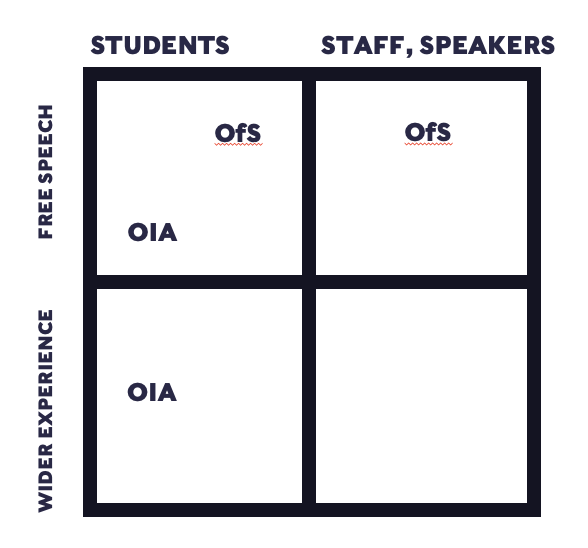Will free speech complaints be able to bypass the university?
Jim is an Associate Editor (SUs) at Wonkhe
Tags
In the piece he rehearses some interesting questions about the expectations that will surround the new duty to “promote” free speech, the relationship between students’ unions, universities and OfS, and complaints.
On that, thus far most have tended to head scratch over the relationship between the Office of the Independent Adjudicator and the messy potential overlap between its complaints scheme and the one that OfS will shortly be running.

In the piece Andrew notes that we don’t yet know if OfS would expect to take complaints directly from students, staff and the public, or expect universities to have their own complaints processes as the first port of call.
He’s right insofar as Section 5 (1) b of the Bill says that OfS’ new scheme may include a provision that a complaint not be referred under the scheme until the complainant has exhausted any internal procedure for the review of complaints which is provided by the provider or SU.
That presents a very interesting choice indeed for the regulator.
If it doesn’t include that provision, the overlap problem with the OIA will be quite stark. Why would it be OK for a free speech complaint to be fast tracked like that when other forms of complaint can’t be? And if a student who sees the new Director and thinks “I’ll use the OIA for my EDI complaint, thanks” why won’t they be allowed to go straight to the adjudicator?
But if OfS does include that provision, we will be in a very interesting place indeed. OfS right now doesn’t handle complaints but does act on “notifications”. If it says in its complaints scheme “we’ll only look at this if you’ve been via the university”, it would be very weird indeed if simultaneously it was saying “but don’t worry you can still tip us off about something via a separate process and we may well still act on it”. What would then be the point of the provision?
On the other hand, if it said that it would only look at a notification about a free speech issue if the university process had been exhausted, that would mean that freedom of speech and academic freedom would be the only bits of the entire regulatory framework that couldn’t be acted on by OfS until a complaint had completed its run inside a university.
Interesting times.

